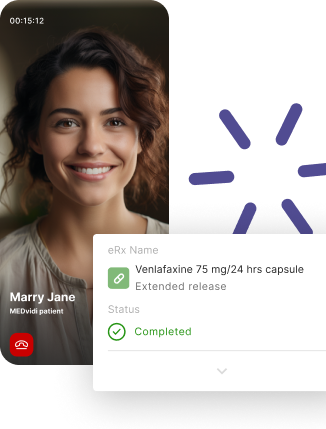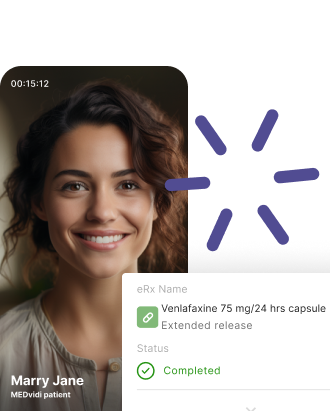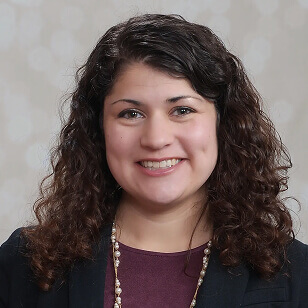Vyvanse has a
Highlights
- Vyvanse is available only by prescription that can be obtained in-person or online after a consultation with a healthcare provider.
- Vyvanse is FDA-approved for ADHD and binge eating disorder in adults. Off-label uses can include narcolepsy, treatment-resistant depression, and some others.
- Vyvanse has several contraindications (hypersensitivity and taking monoamine oxidase inhibitors) and precautions, which should be discussed with a doctor beforehand.
Brand name: Vyvanse
Generic name: Lisdexamfetamine
Drug class: Central nervous system (CNS) stimulants
Dosage forms: Capsules, chewable tablets
FDA-approved uses: Attention deficit hyperactivity disorder (ADHD), moderate to severe binge eating disorder (BED)
Vyvanse is a commonly prescribed medication for the treatment of ADHD and binge eating disorder. It is a controlled substance and requires a prescription from a healthcare provider. Read on to explore how Vyvanse can help patients with the above-mentioned conditions, who can prescribe this medication, and what its basic safety recommendations are.


What Is Vyvanse Prescribed for?
Vyvanse, the brand name of
Here is a closer look at what these conditions are and how Vyvanse can help manage them:
-
Attention deficit hyperactivity disorder (ADHD) is a neurodevelopmental disorder characterized by inattention, hyperactivity, and impulsivity. Its symptoms can have a significant impact on a person’s daily life, including their ability to focus, complete tasks, and interact with others.
Being a stimulant medication, Vyvanse increases the levels of neurotransmitters dopamine and norepinephrine in the brain. This leads to improved focus, attention, impulse control, and reduced hyperactivity.
- Binge eating disorder is a type of eating disorder characterized by recurrent episodes of binge eating. During such episodes, a person consumes large amounts of food in a short period of time. This behavior is typically accompanied by feelings of shame, guilt, and loss of control. Vyvanse can help reduce the frequency and severity of binge eating episodes by regulating appetite and promoting feelings of fullness, thus reducing cravings.

Do You Need a Prescription for Vyvanse?
Vyvanse is available only by prescription. It is classified as a Schedule II controlled substance by the US
Note that booking an appointment doesn’t guarantee obtaining a prescription. The decision is at the discretion of your healthcare provider.
Who Can Prescribe Vyvanse?
Since Vyvanse is a controlled substance under federal regulation, only medical professionals registered with the Drug Enforcement Administration (DEA) are authorized to prescribe it. Doctors and other medical professionals who can prescribe Vyvanse include:
- Psychiatrists. A psychiatrist is a medical doctor who specializes in the diagnosis and treatment of mental health conditions, including ADHD and binge eating disorder. They can prescribe Vyvanse or another medication if appropriate based on your health assessment.
- Primary care physicians. These are medical doctors who provide comprehensive medical care, such as preventive interventions, routine check-ups, and treatment for common medical conditions. These can include doctors of internal medicine (MDs), family physicians, or doctors from other medical specialties. Each of them may be able to prescribe Vyvanse if they have the necessary training, experience, and license to diagnose and treat ADHD or binge eating disorder.
- Other medical professionals. Family doctors, nurse practitioners (NPs), and physician assistants (PAs) may also be able to prescribe Vyvanse if they have the required prescribing credentials and are allowed by their state of practice.
Can Vyvanse Be Prescribed Online?
It is possible to obtain a Vyvanse prescription online through telehealth if you see a licensed medical practitioner qualified to prescribe controlled substances in your state. Note that Vyvanse has a high potential for abuse and dependence, so you have to provide your medical record and go through a symptom assessment during an online consultation.
It’s important to only buy Vyvanse from an online pharmacy if you have a valid prescription. The pharmacy you purchase the medication from should require a prescription. If you purchase Vyvanse from unlicensed sources, you have a risk of getting medication that may have dangerous ingredients or dosages. Talk with your healthcare provider if you have questions about where you can purchase the medication with a valid prescription.
Can a Vyvanse Prescription Be Refilled Online?
A prescription for Vyvanse can be refilled or renewed online if you have a video appointment with a healthcare provider. They will assess your health dynamics, side effects, or other concerns, and evaluate the need for another dosage or other treatment adjustments. Note that a medical provider can recommend another treatment during a follow-up appointment depending on the new details of your health status or responsiveness to treatment.
How to Get Prescribed Vyvanse
Getting prescribed Vyvanse always starts with a symptom check, be it an in-person appointment or an online video consultation. To learn if you can get prescribed Vyvanse online at MEDvidi and receive a prescription if needed, follow the next steps:
- Sign up and book an appointment: Create an account, fill out medical forms, and choose the most suitable date and time for a video call with a licensed healthcare provider.
- See a medical provider: During an appointment, a healthcare practitioner will assess your symptoms and health history to select the most suitable treatment, including medication if required. Remember to discuss the need for follow-up appointments that allow your clinician to monitor your progress and adjust the treatment plan. Also, prescriptions for Schedule II medications cannot be refilled automatically, so you need to consult with a healthcare provider every time you need to get a new Vyvanse prescription online.
- Receive a prescription and pick-up medication from pharmacy: Pick up medication from a pharmacy, if prescribed. Make sure to take the medication exactly as your healthcare provider tells you to and let them know of any side effects you experience.
- Attend follow-ups for ongoing care and prescription refills: Schedule follow-up appointments for ongoing care and adjustments of your medication or treatment plan. Ask your healthcare provider about the steps you will need to take to receive refills of medications. Because Vyvanse is a controlled substance, you may need to have follow-ups with your provider more often than other medications.
If a healthcare provider prescribes you Vyvanse, they will send an online prescription digitally to the pharmacy of your choice. Note that based on your individual health needs, they may prescribe another medication or recommend non-pharmacological options.
MEDvidi operates in the following states:
As a part of online ADHD treatment, MEDvidi providers are able to prescribe Vyvanse online according to local protocols.
Take the first step and see a medical provider to get a personalized treatment plan for ADHD.
Vyvanse Cost
The
Note that the above information about Vyvanse dosage is basic, and your healthcare provider will develop a personalized treatment strategy. Always take the medication according to individual instructions to avoid overdose and adverse reactions.

Vyvanse is also available in a generic formulation of lisdexamfetamine. You can talk with your healthcare provider or pharmacist about taking generic lisdexamfetamine, which may be a more affordable option.
What to Discuss With Your Doctor Before Getting a Vyvanse Prescription
If you directly ask your doctor for Vyvanse, it doesn’t guarantee it will be prescribed — the choice of medication depends on many factors. Here is a list of things to discuss with your healthcare provider to help them determine the most suitable course of action:
- Describe your symptoms. Be specific about the symptoms you are experiencing and how they are impacting your daily life. This will help your doctor understand the severity of your condition and choose the appropriate treatment.
- Share your medical history. Provide your doctor with a comprehensive medical history, including any previous diagnoses, medications, or treatments you have tried in the past and whether those attempts were effective. For example, if you had severe side effects from another stimulant medication(s) for ADHD, a healthcare provider may recommend switching to non-stimulant options. Remember to also discuss contraindications and precautions.
- Discuss alternatives. Vyvanse is not a one-size-fits-all solution. After an assessment, it is important to discuss alternative treatments or medications that may be effective in managing your ADHD symptoms.
It is important to be open and honest with your doctor about your symptoms, concerns, and goals for treatment. This will help your doctor understand your needs and decide whether Vyvanse is an appropriate medicine for you.

Additional Questions to Ask About Vyvanse
When prescribing a medication, your doctor will provide you with detailed instructions. However, you can also ask any questions during an appointment to learn more about the treatment process, potential pitfalls, and how to avoid them. Here are a few examples of important questions:
- What are the most common and rare side effects and how long do they last?
- When does Vyvanse start working and when is it time to choose another treatment?
- How to avoid addiction considering Vyvanse’s potential for dependence?
- How long should I take Vyvanse?
- What happens if I miss a dose or stop taking it abruptly?
- How often should I attend follow-up appointments?
All these help to have an informed discussion with your doctor and create a treatment plan that suits your needs.
Who Should Not Take Vyvanse?
While Vyvanse can be an effective treatment option for ADHD, there are certain groups of people who should not take it:
- Patients with known allergy to amphetamine or other products of Vyvanse.
- Patients currently using or have used monoamine oxidase inhibitors (MAOIs) in the past 14 days.
Vyvanse may also not be suitable in the following cases and should be used with extreme caution under the supervision of a medical professional:
- Individuals with heart problems have an increased risk of
serious heart problems[5] and high blood pressure, so taking Vyvanse can put them at increased risk of serious cardiac complications. - Patients with a history of drug abuse or addiction may be at increased risk of developing a dependence on this medication, as it can be habit-forming.
- Individuals with glaucoma are at risk when taking the medication as it can increase intraocular pressure, which can be dangerous for them.
- Patients with anxiety or agitation or other mental health problems can experience these symptoms or new symptoms more severely.
- Pregnant or breastfeeding women should avoid taking this medication due to limited research on its safety and may cause harm to infants.
- Children who are growing can have decreased growth. Their height and weight should be monitored closely while taking Vyvanse.
How to Take Vyvanse Safely
- Typical dosing: Vyvanse is usually started at 30 mg once daily for both ADHD and BED treatment. When taking Vyvanse for ADHD or BED, the dose may be increased up to 70 mg once daily. Usually, higher doses of Vyvanse are needed to treat BED. It’s important to only take the dose of Vyvanse your healthcare provider instructs you to take.
-
How to take Vyvanse: Vyvanse should be taken in the morning with or without food. The capsules should be swallowed whole, and if using the chewable Vyvanse, the tablets should be completely chewed before swallowing.
-
What if you miss a dose: If you miss a dose of Vyvanse, take it as soon as you remember. If it is later in the day, you should skip your dose as it can cause insomnia. If it is almost time for your next dose, skip the missed dose and take your next dose as scheduled.
-
How to store Vyvanse: You should store Vyvanse at room temperature. It should be protected from light and kept in a dry area. It’s important to store Vyvanse in a safe place away from children, such as a locked cabinet.
-
Alcohol: Although there is no specific interaction with Vyvanse and alcohol, you should talk with your healthcare provider before using alcohol.
-
When to talk to your provider: It is important to follow all instructions your provider gives you when taking Vyvanse. You should not take a different dosage than they instruct you to take. Talk with your healthcare provider about any side effects you experience, and talk with them before you stop taking the medication.

Vyvanse Side Effects
Here are some of the most common side effects of Vyvanse which may go away within a few days:
- Anxiety
- Irritability
- Insomnia
- Dizziness
- Decreased appetite
- Loss of appetite
- Weight loss, anorexia
- Nausea and vomiting
- Diarrhea
- Dry mouth
- Stomach pain
There are also more serious side effects:
- Mental issues (unusual thoughts or behaviors; bipolar, manic, and psychotic symptoms).
- Serotonin syndrome (characterized by fever, fast heartbeat, hallucinations, movement problems, and coma).
- Peripheral vasculopathy, as well as Raynaud’s phenomenon (blood circulation issues in fingers and toes).
- Cardiovascular problems (increased heartbeat, high blood pressure, and unexpected heart attack or a stroke).
- Motor and verbal tics, which is a lack of control of words or movement of limbs.
If you are taking Vyvanse and experiencing any of the aforementioned side effects, it is important to speak to your healthcare provider. While some of these side effects may be mild and resolve on their own, others may require medical attention or a change in treatment plan.
Vyvanse Alternatives
Recommended alternative treatments may vary depending on individual needs. For example, alternative stimulant medications include Adderall, Ritalin, Focalin, Dexedrine, and some others. If you have intolerable side effects from stimulants, your healthcare may consider prescribing a non-stimulant medicine for ADHD, such as Strattera, Qelbree, Intuniv, etc.
For binge eating disorder, Vyvanse is the only FDA-approved medicine. Its alternatives for this condition mostly include antidepressants (selective serotonin reuptake inhibitors (SSRIs) or Bupropion).
Note that not everyone needs medication for ADHD or BED. A healthcare provider may refer you to a psychotherapist or suggest self-help lifestyle changes if it’s deemed suitable for your situation. Your healthcare provider will work with you to determine the best treatment option for you.
Summing Up
Vyvanse is available only by prescription which you can obtain in-person or online if it’s deemed a suitable treatment option for you. It has proven effectiveness in treating ADHD and BED but it can also cause side effects and has a potential for misuse and dependence, so it’s important to follow the doctor’s instructions. Healthcare providers at MEDvidi are qualified to assess your symptoms and prescribe Vyvanse or another suitable medication online; schedule an appointment to receive personalized recommendations.
FAQ
Can you buy Vyvanse without a prescription?
No, Vyvanse is a prescription medication, so you cannot buy Vyvanse without a prescription.
Can you get prescribed Vyvanse without ADHD?
Aside from ADHD patients, Vyvanse can be prescribed to people with binge eating disorder. Doctors may also prescribe it off-label for narcolepsy, depression, or cognitive impairment, among other conditions. The decision to prescribe Vyvanse without an ADHD diagnosis is made by a medical professional on a case-by-case basis.
How can I get Vyvanse prescribed?
Schedule an appointment to talk with a healthcare provider. Discuss your symptoms and treatment goals. If they determine Vyvanse is the correct treatment for you, they will provide you with a prescription for the medication.
Can virtual healthcare providers prescribe Vyvanse?
Yes, virtual healthcare providers who are licensed and able to prescribe controlled substances virtually in their state will be able to provide a Vyvanse prescription.
What to say to a healthcare provider to get Vyvanse?
Be honest with your healthcare provider. Describe your symptoms, share your health history, and talk with them about your treatment goals. They will work with you to determine the best treatment option for you.
How long is the Vyvanse prescription good for?
In the United States, the validity of a Vyvanse prescription depends on the prescribing provider and the laws of the state where the prescription was written. In general, the prescription of Schedule II controlled substances, including Vyvanse, cannot be refilled under federal regulations and is valid for a period of 30 days from the date it was written, after which a Vyvanse prescription expires, and you’ll need a new prescription.
Can you get a Vyvanse prescription refilled early?
If you need to refill your prescription earlier due to unforeseen circumstances, contact your healthcare provider for guidance. Refilling a Vyvanse prescription early without a valid reason and without the approval of the prescribing practitioner can be illegal and may result in legal and medical consequences.
Can I be prescribed Vyvanse while on Suboxone treatment?
Using Vyvanse together with Suboxone can cause













